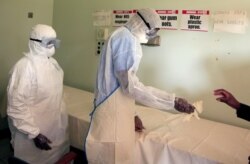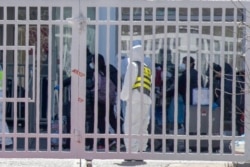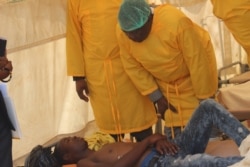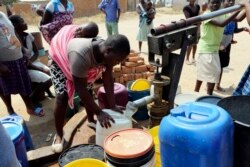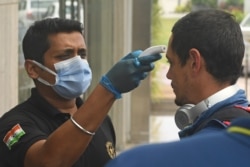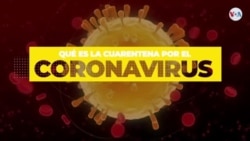As the coronavirus continues to cause uncertainty and fear in the world, resulting in travel restrictions, shutdown of businesses, and increasing rates of infection and death, Zimbabwean officials are calling for calm in the country, and assuring its citizens that they are prepared for the virus. There are no reported cases of the dreaded coronavirus in Zimbabwe, but as a precaution, President Emmerson Mnangagwa has declared COVID-19 a national disaster, and stepping up precautionary measures that include restricting unnecessary travel, discouraging large gatherings such as weddings, and also national events like the upcoming independence anniversary. To find out more about Zimbabwe’s state of preparedness against the coronavirus and also clarification about the pandemic, Blessing Zulu of VOA’s Zimbabwe Service spoke with Dr. Agnes Mahomva, Permanent Secretary of Health
Dr. Mahomva: Coronavirus are a large family of viruses that are common in both humans and animals. This common human coronavirus typically causes mild to moderate infection. Sometimes, though, new coronaviruses emerge, and this is where this new one - what we are now calling the COVID-19 emerged, and according to WHO (World Health Organization), when they declare pandemics, they are basically saying there is a new worldwide spread of a new disease. So this is a new disease that has spread all over the world and as we speak its in over 135 countries, and this is one of the reasons they they decided it is really now a pandemic - a new disease that has spread all over the world.
Blessing Zulu: And how does it compare to the common cold or flu?
Dr. Mahomva: It very much have similar signs and symptoms. You know, a bit of cough, sneezing, sometimes a bit of high temperature and so on. But the thing we are noticing is that the usual common cold tends to be mild, moderate, whereas this one has really caused a lot of havoc, as you have seen in China where it started. A lot of people dying, in other words it's very toxic up there, and this is what is really the most concern.
BZ: And what are some of the symptoms of the coronavirus?
Dr. Mahomva: You are really looking at fever, you have cold, sneezing, shortness of breath. Its basically symptoms that tend to be more in the respiratory system. You have a fever, you’re coughing, sneezing shortness of breath. Those are the main ones that we're looking at.
BZ: How is it spread?
Dr. Mahomva: It’s very much similar to what happens with a common flu. The virus is found in droplets from the throat and the nose. When someone coughs or sneezes, other people near them can breathe in those droplets. The virus can also actually be spread when someone touches an object with a virus. So if someone sneezes or they wipe their nose and mouth with a hand or something, and they touch something else, that virus goes on that surface, and if somebody touches that object or surface, they can then also get it on their hands, transmit it by touching their eye, their mouth, their nose, and they get the infection. This is basically how it spreads.
BZ: We have heard some people, especially on social media , saying coronavirus does not affect black people. Is this true?
Dr. Mahomva: This is speculation. It's very difficult for anyone to say now. Remember I said this is a new virus. So there has not been enough research for us to simply say that at the moment. This is a new virus. There's lots of what happening. I do realize that people are looking at Africa where we don't have as many cases as we're seeing in China and now Europe which has actually taken over. So I do understand when people begin to think like that, but let's remember that we really need science to prove that, to be confident to say that if that's the case. So if we wait for researchers or signs that might confirm it or not confirm it.
BZ: Who is at most at risk of catching the virus?
Dr. Mahomva: Once again, because this is a new virus, we have tended to look at the lessons that have been learned from China where the COVID-19 disease was first reported. And from those lessons it is very clear that the people who are at a higher risk of getting this in, getting actually very sick or dying from COVID-19 include the older people, and people with pre-existing health conditions such as heart disease, diabetes and other lung diseases. So those are the people based on the lessons that we have learned from China, which has handled this several cases.
BZ: And of course, there are no reported cases of the coronavirus in Zimbabwe as far as we understand. But how has that been established?
Dr. Mahomva: I’m so glad you asked that question, because I think people are really wondering. Some have even gone as high as saying may be the case is being hidden or anything like that. Nothing like that at all. I do think we have taken lessons that we have learned from our managing cholera, dysentery and so on and so on, and immediately apply those lessons, to this new epidemic. In December last year at the very beginning, around 4 December if I may be specific, we actually had a simulation of preparedness and response to cholera, ebola and other similar diseases such as coronaviruses outbreaks.
And we had in that session, actually, other countries participating - 43 - some through teleconference and so on, and we were really going through the simulation - what is it that we need to do; where can we strengthen, and so on, and then soon after that, we heard WHO talking of this serious new disease from China. And so when were literally all ready, we just know who to restrengthen what we had already learned. We immediately realized that this is not a health sector issue alone, it is an inter-ministerial, all sectors. We needed to put our preparedness and response plan in place. And we're implementing that again with other sectors, and so, experiences we've had with all those other diseases, really has helped us be ahead of most, if you like. And of course, others might not realize that and think that, ah ah, how has Zimbabwe done that, perhaps they are just not telling us the whole story. But we're very proud and confident of what we've done. Lots still to be done, yes, but that's where we are.
BZ: What is the testing process from the various ports of entry?
Dr. Mahomva: Our response, preparedness and response. And we have tended to focus more on surveillance and ensuring that we are not getting imported cases from places that have confirmed cases and so on. So really we're focusing on screening people at ports of entry taking their temperature, and this is very much in line with WHO guidelines. We're taking a good strong history, documenting it, documenting where the people are going from the airports. If one has got the history of having traveled a country where there are concerns cases where transmission is taking place, they have a temperature, and so on.
Those are the candidates we have immediately, we have an ambulance on standby, at the airports. And we immediately take them to isolation, where we do state assessments, test them and make sure that everything's all right. Just to remind you, though that most of the cases that are coming through, are really suspected cases actually ending up not to be suspected cases in line with the WHO guidelines, but still because we are strengthening our surveillance, we're making sure even those are tested.
BZ: Is there any known cure for this coronavirus?
Dr. Mahomva: There are lots of medicines that have been tried again once again, we are really looking at China who had the first cases, and their researches, responses, they have come up with some drugs that they are trying, using, but again because this is a new virus, its taking time, a little more time to really say this is the medicine or the drugs that it's going to do the trick. And remember, viruses have always been very difficult to treat, if you like. So a lot of the management that is required is really more supportive than anything else.
BZ: And how equipped is Zimbabwe to handle cases of Coronavirus if someone is infected for example? Where are they hospitalized?
Dr. Mahomva: Just to remind you that most infected people with this virus, over 80% in fact, recovered from the disease without needing any special treatment. That is very key for the public to know that we're talking of a very small percentage of those, if they do get it, they actually get very ill, and then they're required to be hospitalized, and they also further require to be taken in intensive care units. So just remember, over 80% they will get it and will recover very nicely with good supportive management. But that tiny percentage, as a country we have made sure our isolation facilities are ready for them Wilkins (Hospital) is one of them. But also remember, we say ICU management of central hospitals. We are at the moment trying to beef them up and make sure that if we do have one or two of those cases, we should be able to isolate them in the right places where they can get the management and the high level management that they might require.
BZ: There is also a problem of water. Would this not present problems for your ministry when it comes to fighting this virus?
Dr. Mahomva: Water shortage of water in people’s homes or anywhere for that matter actually, whether it’s at work, whether in the vicinity and so on, and just to remind you again, we have handled, we have death with cholera, dysentery and so on. So we have been strengthening our systems. We continue struggling with water, that resource, quite clearly we won’t deny it. But we've also managed to find innovative ways of making sure that our population knows that the little resource that you have, the water, the little water that you have, use it efficiently in the right way.
And if those messages continue to go out, we manage our cholera outbreak very successfully. Remember, that also requires lots and lots of water. But what we had, people are now aware that you need to use it efficiently. We're also looking at this as new ways of making sure that you're keeping your hands clean, not just by water but using the alcohol rub, for example. Everything that you can. We're encouraging people not to shake hands so that you don't even get the infection on your hands in the first place, then you're not going to be requiring gallons of water. We still want you to wash your hands, but prevent getting in touch with the virus in the first place. Then we can actually be able to be ahead of the disease.
BZ: Cases are rising in South Africa, Dr. Mahomva. Is it time to close the borders?
Dr. Mahomva: We as a country when we started, no, we didn't close the borders, but we, we are very vigilant. As I said, we have strengthened our surveillance at the borders to make sure that we are able to pick up those we need to be tested, those who need further assessment and so on. And we are continuously reassessing. Tomorrow it might change, but this is based on what we're seeing on the ground. I think others have closed their borders, that’s good and well for them.
But look what's happening now is cases where they're coming from China is actually going down tremendously. And where they are coming to in South Africa and cases are going up. So it's an issue that we have to be very proactive in terms of continuously using data, to make sure we're making the right decisions, and not to just follow everybody, because everybody is doing. Using the data to guide us on what to do, it’s very critical, and that's what we are doing.
BZ: Others are also calling for even more drastic measures like stopping people from gathering in large groups. Have we reached that stage yet?
Dr. Mahomva: We are saying, first of all, those want to travel, please don't go to places countries where there are confirmed cases. We are advising them not, unless you really have to. It’s the same advice that we're giving at the moment in terms of gathering and so on. We avoid going into those gatherings. It helps a lot. So that's the advice we're continuously giving our public so that they are aware that you're exposing yourself to these large gatherings where you might have cases. But once again because Zimbabwe don't have any confirmed cases yet, this is just advice we're giving. Again, as the data continues to come through, we'll use that to continuously review our advice to our population. So we are giving daily, and I mean daily updates to the public, we are posting it, and if something changes tomorrow, you’ll see and you hear from us. We're taking this very seriously. But once again, we prefer to be guided by evidence, by data, and not just follow everybody because everybody's doing it.





